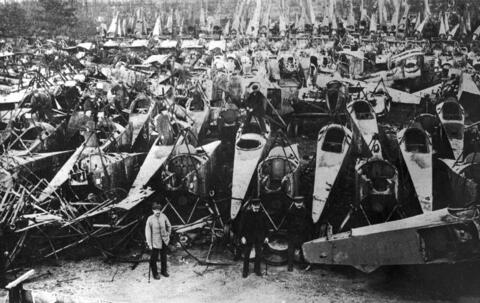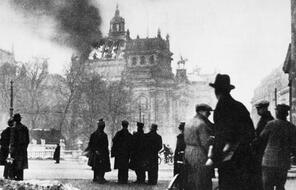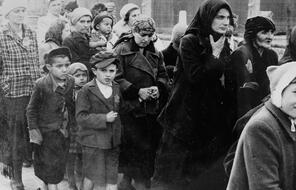Rumors of Betrayal
At a Glance
Language
English — USSubject
- History
- Human & Civil Rights
- The Holocaust
Writing in 1939, German journalist Sebastian Haffner remembered his feelings as an 11-year-old upon hearing that the war had ended:
On the eleventh there was no army bulletin on the notice board at my local police station when I appeared there at the usual time. Empty and black, the board yawned at me. Horror overcame me to think that the board, which had sustained my spirit and nourished my dreams every day for years, would remain empty and black forevermore. I walked on. There must be some news from the front somewhere. If the war was over (and one had to reckon with that possibility) there must at least have been some sort of end worth reporting, something like the final whistle at a soccer match. A few streets away there was another police station. Perhaps there was a bulletin there.
There was none there either. The police had obviously also been infected by the revolution, and the old order had collapsed. I could not come to terms with it. I wandered on through the streets in the fine November drizzle, looking for news. The neighborhood became less familiar.
Somewhere, I saw a bunch of people gazing into the window of a newsagent's shop. I joined them and carefully edged my way to the front. There I could read what they were all reading in silence and gloom. It was an early edition of a newspaper and it bore the headline "Armistice Signed." Underneath were the terms, a long list. I read them. As I read, I turned to stone.
How shall I describe my feelings—the feelings of an eleven-year-old boy whose entire inner world has collapsed? However much I try, I find it difficult to find an equivalent in ordinary, everyday life. Certain fantastic catastrophes are possible only in dream worlds. Maybe one could imagine someone who year after year has deposited large sums of money in his bank, and when one day he asks for a statement, discovers a gigantic overdraft instead of a fortune; but that happens only in dreams.
The terms no longer spoke the careful language of the army bulletins. They spoke the merciless language of defeat; as merciless as the bulletins had been, when they spoke of enemy defeats. The fact that such a thing could happen to “us,” not as an isolated incident but as the final result of victory upon victory, just would not fit in my head. 1
As the Social Democrats and their allies were trying to restore order to the nation and organize a democratic government, a rumor spread rapidly through Germany. It was whispered at first and later openly proclaimed: “Germany did not lose the war. While our soldiers were putting their lives on the line, they were being betrayed by others back home.” Who betrayed Germany? Who stabbed the nation in the back? General Erich Ludendorff, a war hero, told lawmakers that the nation had been betrayed by Social Democrats, the Catholic Center Party, socialists, and Jews. In fact, German military leadership, realizing in the last months of the war that their country could not win, had asked for an armistice. So why did the idea that the war was lost because of a betrayal gain such traction?
When Friedrich Ebert, the leader of the Social Democrats, and the heads of other large political parties took charge of the nation on November 10, 1918, they learned for the first time the terms of the truce that Germany had already begun to negotiate. In exchange for a ceasefire, the Allies were demanding that Germany give up its armaments, including all its ships and submarines, and pull back all troops to the eastern side of the Rhine River, giving up the territory it had gained from the war in eastern Europe and Russia. If Germany did not accept these terms within 72 hours, the Allies would invade the country.
Germany’s new leaders were not sure how to respond. Matthias Erzberger, the head of the Catholic Center Party, asked Paul von Hindenburg, the commander-in-chief of the German Armed Forces, for advice. Hindenburg, who after the war became one of the most powerful supporters of the “stab in the back” myth, tearfully told Erzberger to do his patriotic duty by signing the document immediately. There would be no negotiation.
So early on the morning of November 11, Erzberger and two other representatives of the new republic journeyed to France and signed the agreement. The generals did not attend the armistice signing; they did not want their names associated with the document.
When the German people finally learned the terms of truce later that day, almost everyone was outraged. Few blamed the generals or the kaiser for the nation’s defeat. Instead they placed the blame on the people who signed the armistice—the Social Democrats and the Catholic Center Party. Historian Richard Evans notes:
All of this was greeted with incredulous horror by the majority of Germans . . . Germany’s international strength and prestige had been on an upward course since unification in 1871, so most Germans felt, and now, suddenly, Germany had been brutally expelled from the ranks of the Great Powers and covered in what they considered to be undeserved shame. 2
Their anger only increased when the terms of the Treaty of Versailles were made public in May 1919 (see reading, Negotiating Peace). Many Germans felt that their nation had been humiliated by the further loss of territory and military power imposed by the treaty. According to Evans, the shock of the Treaty of Versailles united many Germans in “a grim determination to overthrow its central provisions, restore the lost territories, end the payment of reparations and re-establish Germany as the dominant power in Central Europe once more.” 3
- 1Sebastian Haffner, Defying Hitler: A Memoir (Farr, Straus & Giroux, 2000), 26–27. Reproduced by permission from Farrar, Straus & Giroux.
- 2Richard J. Evans, The Coming of the Third Reich (New York: Penguin, 2003), 66. Reproduced by permission from Penguin Random House UK and Penguin Press.
- 3Richard J. Evans, The Coming of the Third Reich (New York: Penguin, 2003), 72. Reproduced by permission from Penguin Random House UK and Penguin Press.
Dismantled German Aircraft after WWI

Dismantled German Aircraft after WWI
German military aircraft being dismantled and scrapped after World War I, according to the terms of the Treaty of Versailles.
Connection Questions
- What words would you use to describe Sebastian Haffner’s feelings when he learned of Germany’s defeat? Why would such news be especially difficult for an 11-year-old to understand?
- Where did the “stab in the back” idea come from? How might it have become an accepted “truth”?
- How do rumors, falsehoods, and half-truths take hold today, and how might we look at them critically?
- Resentment, despair, and anger are powerful feelings that often emerge out of truly difficult circumstances and experiences. Must those feelings always lead to lashing out against others and a search for scapegoats? When can such feelings inspire us to work for positive, inclusive change and to reject more destructive or violent responses?
How to Cite This Reading
Facing History & Ourselves, "Rumors of Betrayal," last updated August 2, 2016.








